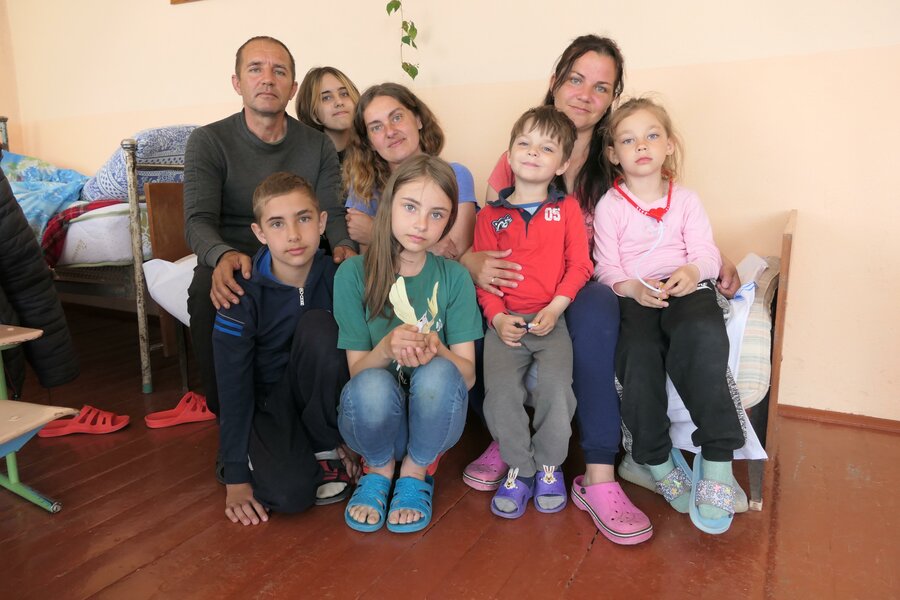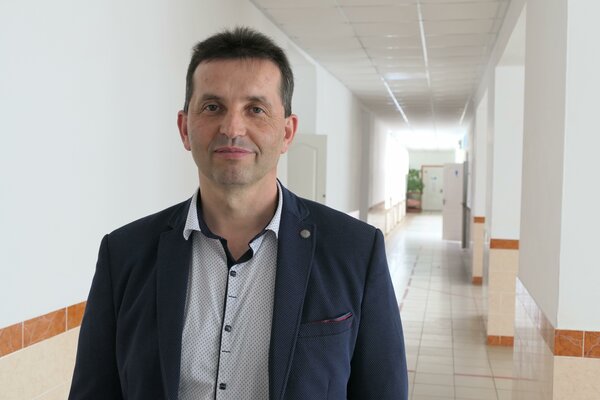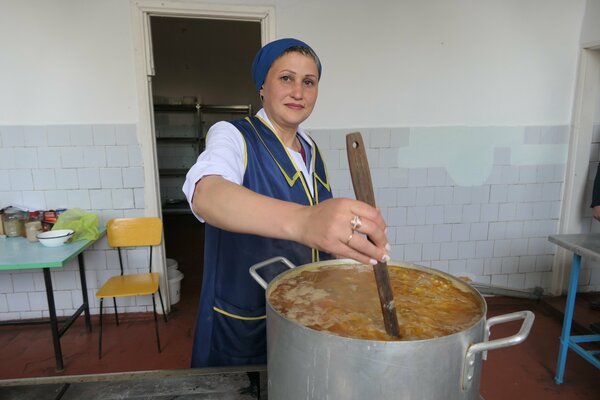Ukraine: 'We're a small community but we have one big heart'

The principal of Severynivka’s primary school sent the children and teachers home in April. They are yet to return. Gone are the familiar sounds of children chattering or echoing school bells along the pristine corridors. During my two days there, I only ever heard the faint rumble of a washing machine, two chirping cockatiels and the occasional yap of a pug.
Classroom desks are now used as ironing tables and baby changing stations. The small chairs have been repurposed as bedside tables, and where there once was a stack of math books, there's now a large blue and white cage for a guinea pig named Mable.
A total 7.1 million people are displaced inside Ukraine due to the conflict and around 4.8 million are taking refuge in neighbouring countries (as of 13 June). Since March, there has been a steady stream of people arriving in the central Ukrainian town of Severynikva. It’s a well-connected pastoral community with a booming reputation. Its claim to fame is that Ukraine's largest raspberry pie (18 metres long) was made there. The residents ate it in four minutes.
These days, the town's reputation is one of overwhelming generosity. Its 8,000 residents, while not especially wealthy, have welcomed over 2,000 displaced people into its homes and school for no other reason than they believe it’s the right thing to do. People now sleep in repurposed classrooms, with pupils back to online learning.
“We realize we could be in their position now,” says Yevhen the deputy head of administration for the municipality. “So today, if there is a chance to help someone, every member of our community is glad to do so.”
Most arrivals carry few possessions – whatever fits into a bag, usually. But they are soon equipped with clothes, toiletries and, importantly, a peaceful place to stay.
“We're a small community but we have one big heart,” says school principal Oleg.


The bedframes and mattresses donated by residents sit beneath blackboards. Bookshelves for encyclopaedias now host framed family photos, identity documents, toothbrushes, house keys and other personal belongings grabbed in the moments people left their homes.
The centre of the school building is a canteen where Severynivka's citizens operate in shifts to provide three meals a day for the residents. Like many items in the school-hotel, food is donated by the community or bought in bulk when residents pool their cash.
Ukrainian hospitality norms dictate that even I receive three meals there during my visit. I can vouch that the battered fish, dill potatoes, vegetable soup, cookies and bottomless raspberry tea on offer were all nourishing and comforting.
Once new residents arrive, Oleg takes them over the road to the municipal hall. There, each family has the opportunity to register for financial support from the World Food Programme (WFP) by scanning a unique QR code which directs them to a registration site.

After leaving Ukraine in 2018, WFP re-established a presence in Ukraine this year. The immediate priorities are “to ensure that we reach people wherever they need us,” explained Emergency Coordinator Matthew Hollingworth.
“We do this in two main ways: through cash and food. WFP signed an agreement with the government in May, which was critical in helping us to identify internally displaced people and others who needed our support. By doing this, WFP increased our cash transfers six-fold in just one month.
"People who register are getting their cash just 72 hours later to cover their food needs as well as medicine and clothes. It was also important that we moved from one-off rations to 30-day food parcels that families can rely on. WFP are now providing pasta, rice, oil and tinned meat.”
Olena, mother of three who drove hundreds of kilometres through active fighting to reach the safety of Severynivka, says: “[We] bought some stuff for the kids, some detergent, shampoo, hygiene stuff. And we are saving the rest for now. We have no idea what's next for us.”

“We are planning on using the money for housing. We really want to rent a place where we could live. This school is temporary, and we want to rent our own place; we're looking for a place now.”
Every family has unique requirements, so WFP provides them with cash support. That money offers both the opportunities to pay for the services and goods they each need, while local businesses and economies receive a fresh injection of hard currency.
One in three households in Ukraine is food-insecure, rising to one in two in some areas in the east and south of Ukraine. Cash helps families to boost their food security when they need help the most.
WFP has launched and rapidly scaled up its operations over the last 3 months, and is now providing cash and food to families affected by the conflict. By the end of June WFP will be supporting more than 3 million people each month to meet their immediate needs.


